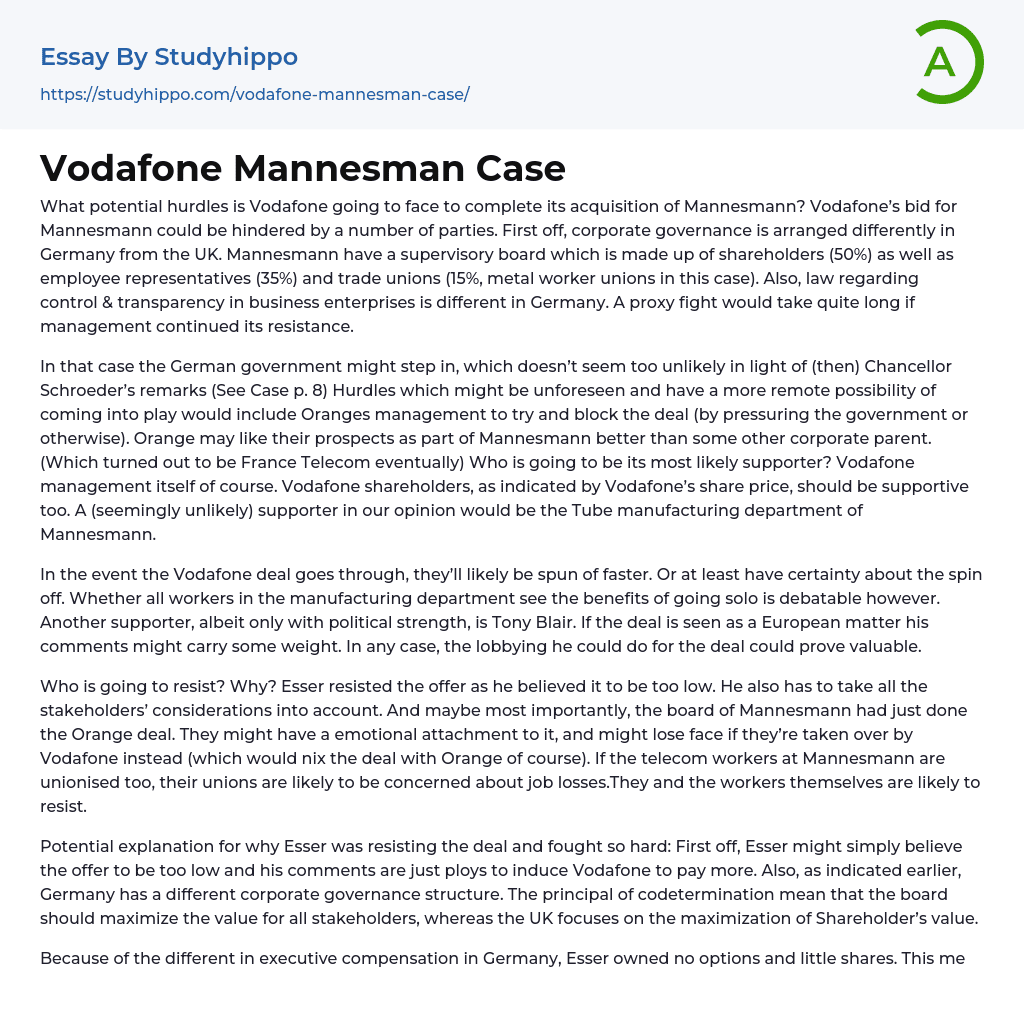What potential hurdles is Vodafone going to face to complete its acquisition of Mannesmann? Vodafone’s bid for Mannesmann could be hindered by a number of parties. First off, corporate governance is arranged differently in Germany from the UK. Mannesmann have a supervisory board which is made up of shareholders (50%) as well as employee representatives (35%) and trade unions (15%, metal worker unions in this case). Also, law regarding control & transparency in business enterprises is different in Germany. A proxy fight would take quite long if management continued its resistance.
In that case the German government might step in, which doesn’t seem too unlikely in light of (then) Chancellor Schroeder’s remarks (See Case p. 8) Hurdles which might be unforeseen and have a more remote possibility of coming into play would include Oranges management to try and
...block the deal (by pressuring the government or otherwise). Orange may like their prospects as part of Mannesmann better than some other corporate parent. (Which turned out to be France Telecom eventually) Who is going to be its most likely supporter? Vodafone management itself of course. Vodafone shareholders, as indicated by Vodafone’s share price, should be supportive too. A (seemingly unlikely) supporter in our opinion would be the Tube manufacturing department of Mannesmann.
In the event the Vodafone deal goes through, they’ll likely be spun of faster. Or at least have certainty about the spin off. Whether all workers in the manufacturing department see the benefits of going solo is debatable however. Another supporter, albeit only with political strength, is Tony Blair. If the deal is seen as a European matter his comments might carry some weight. In any
case, the lobbying he could do for the deal could prove valuable.
Who is going to resist? Why? Esser resisted the offer as he believed it to be too low. He also has to take all the stakeholders’ considerations into account. And maybe most importantly, the board of Mannesmann had just done the Orange deal. They might have a emotional attachment to it, and might lose face if they’re taken over by Vodafone instead (which would nix the deal with Orange of course). If the telecom workers at Mannesmann are unionised too, their unions are likely to be concerned about job losses.They and the workers themselves are likely to resist.
Potential explanation for why Esser was resisting the deal and fought so hard: First off, Esser might simply believe the offer to be too low and his comments are just ploys to induce Vodafone to pay more. Also, as indicated earlier, Germany has a different corporate governance structure. The principal of codetermination mean that the board should maximize the value for all stakeholders, whereas the UK focuses on the maximization of Shareholder’s value.
Because of the different in executive compensation in Germany, Esser owned no options and little shares. This means he had little incentive incentives to support Vodafone’s bid, certainly at this price. Esser also claimed that 90% of shareholders believed that Mannesmann had better long term prospects as an independent company.
- Absolutism essays
- Appeal essays
- Bourgeoisie essays
- Contras essays
- Corporate Governance essays
- Corruption essays
- Democracy essays
- Democratic Party essays
- Developed Country essays
- Dictatorship essays
- Elections essays
- European Union essays
- Federalism essays
- Foreign essays
- Foreign policy essays
- Gentrification essays
- Hillary Clinton essays
- Income Tax essays
- International Relations essays
- John Marshall essays
- John Stuart Mill essays
- Left-Wing Politics essays
- Liberty essays
- Military essays
- Monarch essays
- Monarchy essays
- Political Corruption essays
- Political Party essays
- Political Science essays
- President Of The United States essays
- Public Service essays
- Red Cross essays
- Reform essays
- Republic essays
- Revenge essays
- Social Security essays
- Sovereign State essays
- State essays
- Supply essays
- Terrorism essays
- United Nations essays
- World Trade Organization essays
- Incentive essays
- Email essays
- Etiquette essays
- Hypertext Transfer Protocol essays
- Mainstream essays
- Marshall Mcluhan essays
- Virtual Learning Environment essays
- Vodafone essays




